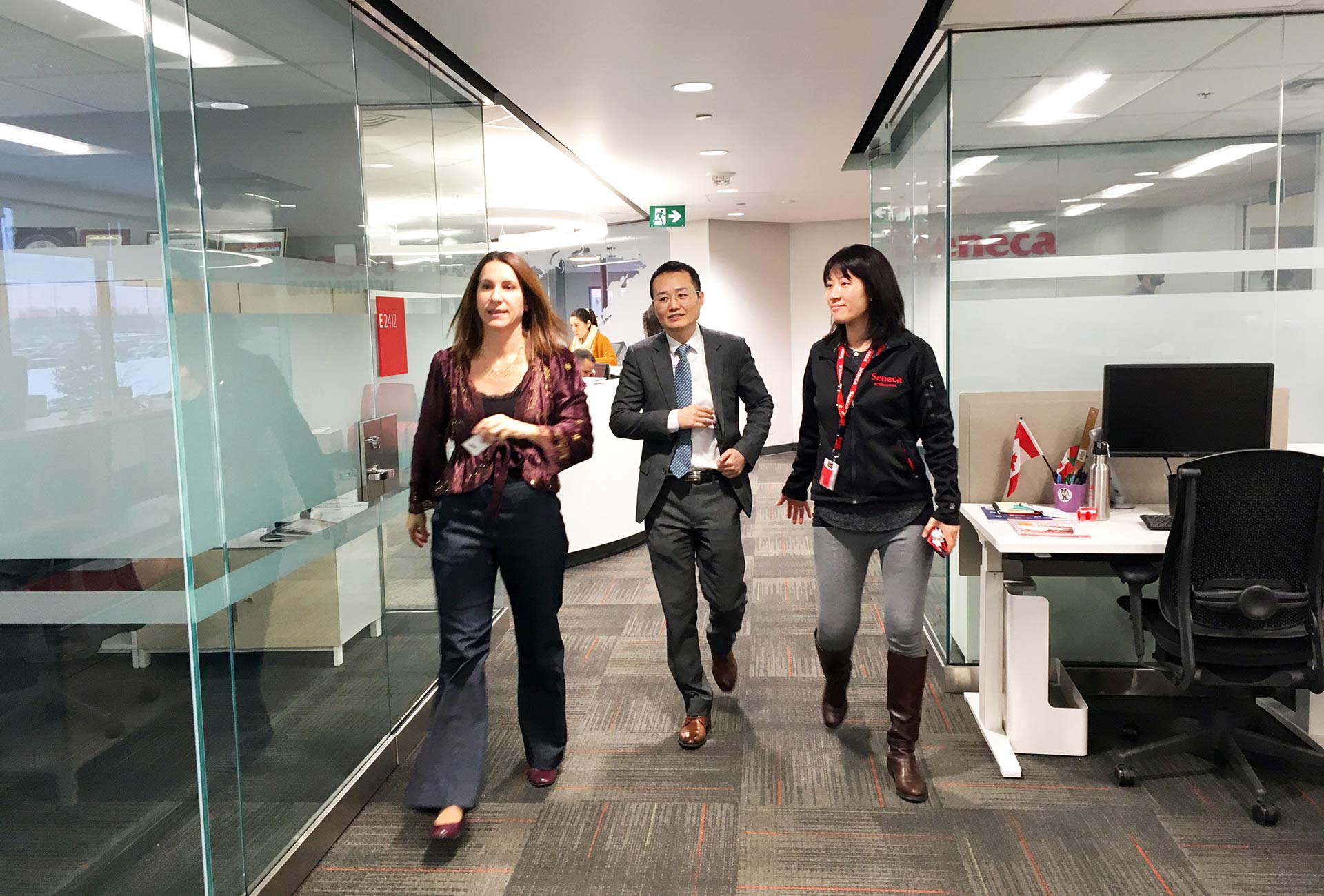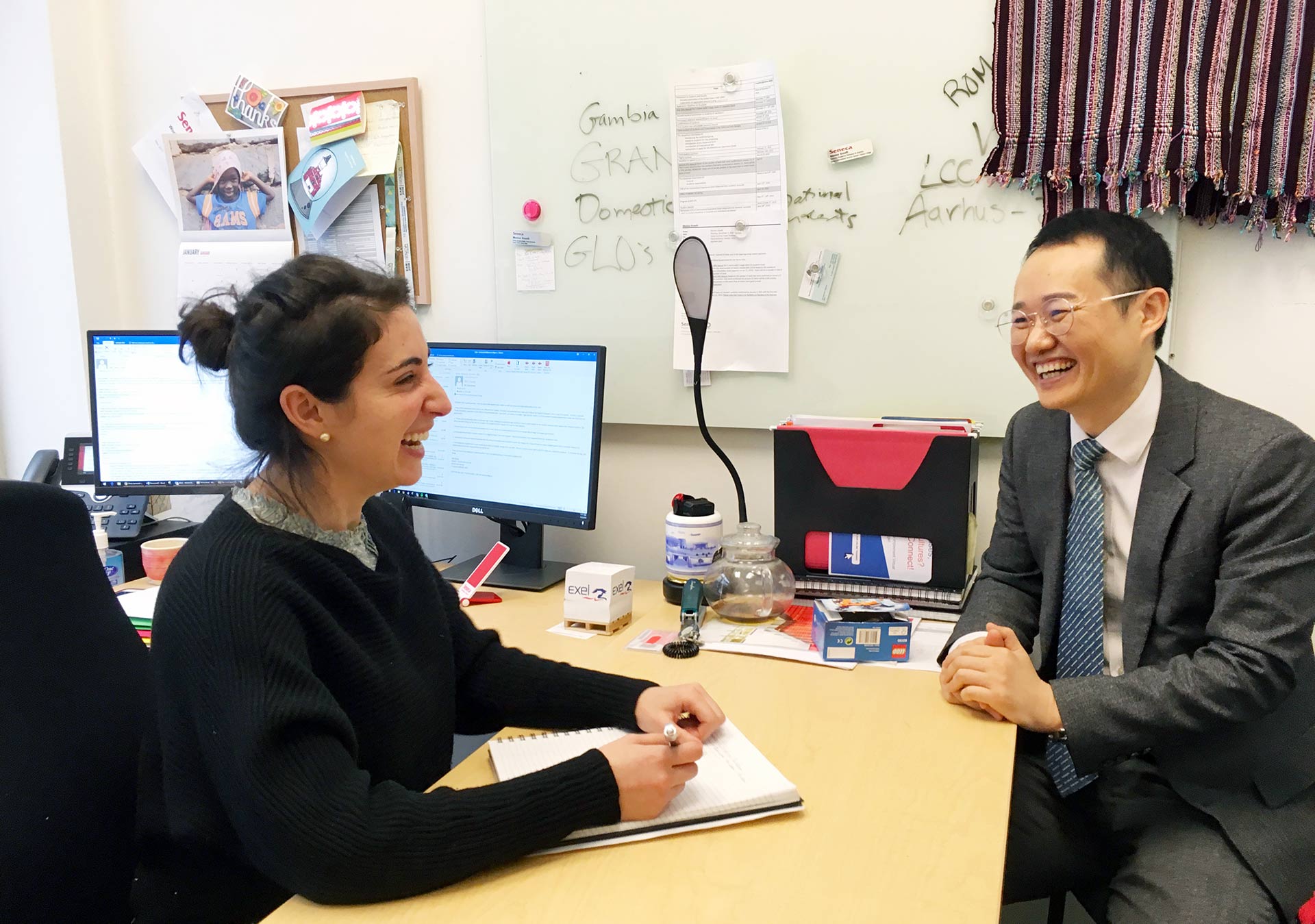
“I found Newnham Campus to be very active with a lot of young people and a lot of international students. The buildings are all connected and I can feel the activation and the passion in the students. I know I can learn a lot of things here.”
Jan. 24, 2019
It was merely a month ago, on Boxing Day, when Professor Bruce Shim and his family arrived in Canada from Korea with eight pieces of luggage in tow, unsure what to expect in a continent they had never set foot on. They are here for 365 days and already, while dining at a local Korean restaurant recently, Shim and his wife looked at each other across the table and said, “Hmm, this tastes a bit strange,” Shim recalled with a chuckle at Markham Campus last week. Then as if he’d be personally responsible for ensuring the authentic Korean experience, Shim quickly offered his hospitality.
“You have to come to Korea. You know, because I’m there. Come to Jeonju! The city is known for the food,” he said.
Shim holds a PhD in hotel management. He is the first visiting professor to Seneca from Jeonju University, a private Christian institution 90 minutes from Seoul by express train. Thanks to a partnership with Seneca since 2016, the university has been sending its students to Seneca’s English Language Institute for short-term study each year.
Shim’s year-long sabbatical at Seneca signals an expansion of collaboration efforts between the two institutions to facilitate opportunities for both students and faculty.

Professor Bruce Shim gets a tour of the Seneca International office with Maria Sairoglou (left), Director, International Training and Development, and Joy Kwon, International Liaison, Asia Pacific Region.
Since the start of the new semester, Shim has participated in orientation activities and observed some classes in the School of Hospitality & Tourism, where he’ll conduct most of his work while at Seneca. He has also taken a campus tour at Newnham and was inspired by what he saw.
“I found Newnham Campus to be very active with a lot of young people and a lot of international students,” said Shim, who heads up the Department of Hotel Management at Jeonju University. “The buildings are all connected and I can feel the activation and the passion in the students. I know I can learn a lot of things here.”
In fact, Shim has been a lifelong learner beginning with his first job as a server at a French restaurant at the Sheraton Grande Walkerhill in Seoul. From there, he went on to work in human resources at the Ritz-Carlton Seoul and later as a human resources manager at Ramada Seoul. He has been a professor for 13 years.
“A great hotelier needs a lot of experience,” Shim said. “The hotel product is a total product. The food needs to taste good, the customer service needs to be good. Everything from the room division to parking needs to be good. That’s why professional management in the hotel industry is tough.”
That being said, Shim believes the end product shouldn’t come at the expense of the employees’ well-being.
“I’m very happy and proud about my work, and I love the hotel industry,” he said. “Here in Canada, the labour standards focus on the working environment and on making sure employees are comfortable. That’s very good. In Korean society, the emphasis is on customer service even if the employees are stressed sometimes. Canada is right; Korea, not right.”

Professor Bruce Shim talks with Monica Kronfli, Director, International Mobility, about his plans for the year.
Working closely with the School of Hospitality & Tourism, Seneca International and the International Mobility Office, Shim will compare programs between Seneca and Jeonju University through class observation and curriculum mapping. He will also provide guest lectures, identify opportunities for Seneca faculty to guest lecture or teach in South Korea, and design an internship/study-abroad program as well as an English-language course in hospitality and tourism at Jeonju.
“Language, along with attitude and professional experience, is key in landing good jobs in the hotel industry upon graduation,” Shim said. “For example, in Singapore, there are many high-end hotels with very good service quality and our students can go there, get full-time jobs and learn a lot. But they need to speak English and they need to learn about the different cultures.”
That’s something Shim, his wife and their two children will immerse themselves in during their year in Canada.
“We entered the kids in public school, got a house, got a car, a bank account, but it’s not easy,” he said. “The people are very kind here but the system is different. I just try to see, as a Korean, what Canada is like. Yes, the weather is colder here, but the air is much better. It’s clean air.”